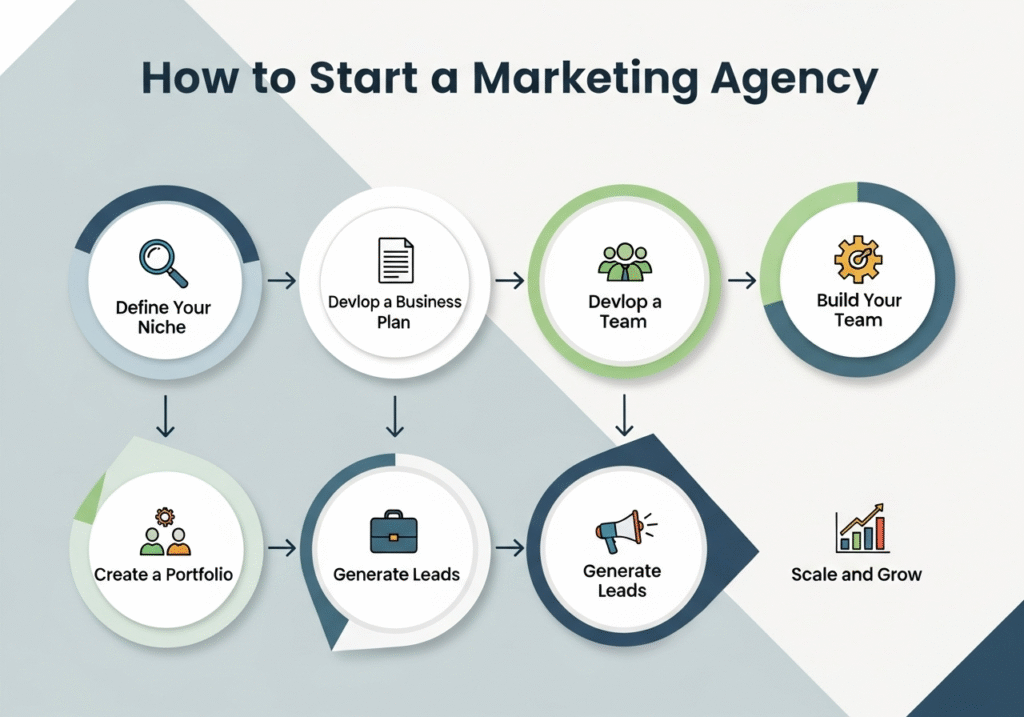Insurance companies and agents face tough competition online, making SEO for insurance companies and agents more important than ever for attracting qualified leads and growing your business. Getting found by potential customers searching for coverage requires a smart SEO approach that speaks directly to their needs and local market.
This guide is designed for insurance professionals, agency owners, and marketing teams who want to improve their online visibility and generate more leads through search engines. We’ll walk you through proven strategies that actually work in the insurance industry.
You’ll discover how to conduct keyword research that targets high-intent insurance shoppers and learn on-page optimization techniques that help your website rank higher in search results. We’ll also cover local SEO tactics that get your agency noticed by people searching for insurance in your area, plus content marketing strategies that build trust and convert visitors into customers.
Understanding SEO Fundamentals for Insurance Professionals

Essential SEO concepts every insurance agent should know
Search engine optimization for insurance companies and agents starts with understanding how people search for insurance products online. When someone needs car insurance, they don’t just type “insurance” into Google. They search for specific phrases like “cheap auto insurance quotes” or “best homeowners insurance near me.”
SEO for insurance companies and agents requires mastering three core concepts: keywords, content quality, and user experience. Keywords are the bridge between what people search for and what your website offers. Quality content answers real questions your prospects have about insurance products. User experience ensures visitors can easily navigate your site and find what they need.
The insurance industry presents unique SEO challenges. Your potential customers often research extensively before making decisions, comparing multiple providers and reading reviews. They want detailed information about coverage options, pricing, and claims processes. This creates opportunities to capture traffic through informational content that guides prospects through their decision-making journey.
Search intent plays a crucial role in insurance SEO. Someone searching “how does car insurance work” has different needs than someone searching “buy auto insurance online.” Your SEO strategy must address both educational queries and transactional searches to maximize lead generation potential.
How search engines evaluate insurance websites
Search engines use complex algorithms to rank insurance websites, focusing heavily on trust signals and content relevance. Google particularly scrutinizes Your Money or Your Life (YMYL) websites, which includes insurance sites since they deal with financial decisions that impact people’s security and wellbeing.
Authority and expertise carry significant weight in insurance SEO rankings. Search engines look for signals that demonstrate your knowledge and credibility in the insurance field. This includes professional certifications, industry affiliations, detailed author bios, and comprehensive coverage of insurance topics.
Technical factors also influence how search engines evaluate insurance sites. Page loading speed, mobile responsiveness, and secure connections (HTTPS) are baseline requirements. Search engines favor websites that provide smooth user experiences across all devices, especially mobile phones where many insurance searches begin.
Content depth and accuracy are critical ranking factors. Search engines can identify thin, generic content that doesn’t provide real value to visitors. Insurance websites that offer detailed, original insights about policies, claims processes, and industry trends typically perform better in search results.
Local relevance plays a major role for insurance agents serving specific geographic areas. Search engines consider location signals, customer reviews, and local business listings when determining which insurance providers to show for location-based searches.
The competitive landscape of insurance keywords
Insurance keywords represent some of the most competitive and expensive terms in digital marketing. Popular phrases like “auto insurance quotes” and “life insurance rates” can cost $50 or more per click in paid advertising, reflecting the intense competition for these valuable search terms.
The competition varies significantly across different insurance types and geographic markets. Auto and home insurance keywords face the heaviest competition, while specialized products like professional liability or cyber insurance often present better opportunities for newer websites to gain traction.
Long-tail keywords offer strategic advantages for insurance SEO. Instead of competing for “car insurance,” targeting specific phrases like “SR-22 insurance for high-risk drivers in Texas” can deliver more qualified traffic with less competition. These specific searches often indicate stronger purchase intent.
Seasonal patterns affect insurance keyword competition. Homeowners insurance searches peak during spring and summer when people buy homes. Auto insurance searches remain steady year-round but spike when people relocate or experience life changes. Understanding these patterns helps insurance professionals allocate SEO resources more effectively.
Geographic modifiers create competitive advantages for local insurance agents. Adding city or state names to insurance keywords typically reduces competition while attracting highly relevant local prospects. “Business insurance Denver” faces less competition than “business insurance” alone.
Common SEO mistakes that hurt insurance companies
Many insurance companies make critical SEO errors that severely limit their online visibility and lead generation potential. The most damaging mistake is creating generic, template-based content that fails to differentiate their services or provide unique value to visitors.
Keyword stuffing remains a persistent problem in insurance SEO. Some companies overload their pages with insurance-related keywords, making content unreadable and triggering search engine penalties. Natural, conversational content performs better than text packed with forced keyword repetition.
Neglecting local SEO costs insurance agents significant business opportunities. Many agents fail to claim and optimize their Google Business Profile, missing out on “near me” searches that drive high-intent local traffic. Incomplete or inconsistent business information across online directories also hurts local search performance.
Technical SEO oversights plague many insurance websites. Slow loading speeds, broken links, and poor mobile optimization frustrate visitors and hurt search rankings. Insurance sites often struggle with complex quote forms that don’t work properly on mobile devices, causing potential customers to abandon the site.
Ignoring content freshness is another common mistake. Insurance companies sometimes create websites and never update them with new content. Search engines favor websites that regularly publish relevant, timely information. Stale content signals that a business might not be active or current with industry developments.
Keyword Research Strategies for Insurance Markets

Finding high-converting insurance keywords
The insurance industry thrives on trust and timing, making keyword selection critical for capturing prospects at the right moment. Start by analyzing search intent patterns – people searching “auto insurance quotes” are ready to buy, while those searching “how does insurance work” are still learning.
Use tools like Google Keyword Planner, SEMrush, or Ahrefs to identify keywords with commercial intent. Look for terms that include action words like “buy,” “quote,” “compare,” or “cheap.” These signal purchase readiness and typically convert better than informational searches.
Focus on insurance-specific modifiers that indicate buying intent:
- “Near me” searches for local agents
- “Cheap” or “affordable” for price-conscious buyers
- “Best” for comparison shoppers
- Specific coverage types like “comprehensive” or “liability only”
Monitor competitor keywords to uncover opportunities they might be missing. Many insurance companies overlook niche coverage areas or demographic-specific terms that could drive qualified traffic at lower costs.
Local vs national keyword targeting approaches
Local insurance agents need a completely different keyword strategy than national carriers. Local agents should prioritize geo-modified keywords like “car insurance agent Springfield” or “homeowners insurance near me.” These searches have lower competition and higher conversion rates for local businesses.
National companies can target broader, high-volume terms like “auto insurance” or “life insurance quotes.” However, they face intense competition and higher costs per click. The trade-off comes in scale – national keywords can drive massive traffic volumes when ranked well.
| Local Keywords | National Keywords |
|---|---|
| Lower competition | High competition |
| Higher conversion rates | Lower conversion rates |
| Smaller search volumes | Large search volumes |
| Geographic modifiers essential | Brand recognition crucial |
| Cost-effective for small budgets | Requires significant investment |
Local agents should also target neighborhood names, nearby landmarks, and regional terms. Someone searching “insurance agent downtown Portland” is likely within driving distance and ready to meet. National companies benefit from targeting insurance product categories and comparison terms that capture users researching options across multiple providers.
Long-tail keywords that drive qualified leads
Long-tail keywords represent the goldmine of insurance SEO. These specific, multi-word phrases attract highly qualified prospects who know exactly what they need. Instead of competing for “car insurance,” target “SR22 insurance for DUI California” or “motorcycle insurance for vintage Harley Davidson.”
Long-tail keywords work because they match specific customer problems. Someone searching “home insurance flood coverage after hurricane damage” has an immediate need and clear purchase intent. These searches convert at much higher rates than generic terms.
Build long-tail keyword lists around:
- Specific coverage types and endorsements
- Life events that trigger insurance needs
- Demographics and professions
- Geographic locations and natural disasters
- Vehicle types, home styles, and business categories
Create content hubs around these specific needs. A page about “condo insurance for first-time buyers” can rank for multiple related long-tail terms while addressing specific customer concerns. This approach builds authority in niche areas where competition is lighter but intent is stronger.
Seasonal keyword opportunities in insurance
Insurance demand fluctuates throughout the year, creating predictable keyword opportunities. Smart insurance marketers align their SEO efforts with these seasonal patterns to maximize visibility when prospects are actively searching.
Spring brings home buying season, driving searches for homeowners insurance quotes. Summer vacation planning increases travel insurance interest. Fall triggers life insurance considerations as people review benefits during open enrollment. Winter weather creates urgency around auto insurance claims and coverage reviews.
Hurricane season generates massive searches for flood insurance and property protection. Tax season drives business insurance inquiries as companies file returns and plan for the new year. Back-to-school periods increase searches for student insurance and coverage for college-aged children.
Create editorial calendars around these patterns. Publish hurricane preparedness content before storm season hits. Develop tax-related insurance guides in early spring. Build travel insurance resources ahead of summer vacation booking periods.
Monitor Google Trends data to identify when seasonal interest peaks in your market. Some insurance products have regional seasonal patterns – earthquake insurance searches spike after seismic activity, while wildfire insurance interest grows during dry seasons in western states.
Prepare seasonal content months in advance to capture organic rankings before demand peaks. The insurance companies that win seasonal traffic start their SEO efforts well before the keywords become competitive.
On-Page SEO Optimization for Insurance Websites

Creating Compelling Title Tags and Meta Descriptions
Your title tags and meta descriptions serve as your website’s first impression in search results. Insurance companies need to craft these elements carefully to capture both search engine attention and potential client clicks.
Start your title tags with high-intent keywords like “Auto Insurance Quotes” or “Life Insurance Agents” rather than generic company names. Keep titles under 60 characters to prevent truncation in search results. For example, “Affordable Car Insurance | Get Free Quotes in Chicago” works better than “ABC Insurance Company – Serving Illinois Since 1995.”
Meta descriptions should tell a compelling story in 150-160 characters. Focus on benefits and include a clear call-to-action. Instead of describing what you do, explain what clients gain: “Save up to 25% on auto insurance with personalized coverage options. Compare quotes from top carriers in minutes.”
Include location-specific keywords when targeting local markets. “Denver Home Insurance” or “Miami Business Insurance Quotes” help search engines understand your service areas. Test different variations using A/B testing tools to see which combinations drive higher click-through rates.
Optimizing Insurance Service Pages for Conversions
Insurance service pages need to balance SEO requirements with conversion optimization. Each page should target specific insurance products while guiding visitors toward taking action.
Structure your service pages with clear headings that include primary keywords. Use H2 tags for main sections like “Auto Insurance Coverage Options” and H3 tags for specific features like “Collision Coverage Benefits.” This hierarchy helps search engines understand your content organization.
Create detailed coverage explanations without overwhelming visitors. Break complex insurance concepts into digestible sections using bullet points and numbered lists. For life insurance pages, explain term vs. whole life differences clearly, highlighting when each option makes sense.
Include customer testimonials and trust signals prominently. Insurance purchases involve significant trust, so display licenses, certifications, and positive reviews near quote forms. Place contact information and quote buttons multiple times throughout longer pages.
Optimize for mobile users since many insurance searches happen on phones after accidents or while shopping for coverage. Ensure forms are easy to complete on smaller screens and loading times remain under three seconds.
Internal Linking Strategies That Boost Authority
Smart internal linking helps search engines discover your content while keeping visitors engaged longer on your site. Insurance websites benefit from strategic connections between related topics and services.
Link from broad topic pages to specific coverage details. Your main “Business Insurance” page should connect to specialized pages about professional liability, workers’ compensation, and commercial property coverage. This creates topic clusters that demonstrate expertise across insurance categories.
Use descriptive anchor text that includes relevant keywords naturally. Instead of “click here,” use phrases like “learn about umbrella insurance coverage” or “compare term life insurance rates.” This approach provides context to both users and search engines.
Create resource hubs that link to multiple related pages. A “New Driver’s Guide” could connect to teen auto insurance, defensive driving discounts, and first-time buyer tips. These comprehensive resources often earn backlinks from other sites and keep visitors exploring your content.
Monitor internal link performance using analytics tools. Track which linked pages receive the most traffic and engagement, then replicate successful patterns across similar content areas. Update older posts to include links to newer, relevant content as you expand your insurance coverage topics.
Local SEO Tactics for Insurance Agents

Google My Business optimization for maximum visibility
Your Google My Business (GMB) profile acts as your digital storefront for local insurance searches. Start by claiming and verifying your listing, then fill out every available field with accurate information. Include your business hours, phone number, website, and detailed description highlighting your insurance specialties.
Upload high-quality photos of your office, team, and any community involvement. Google rewards businesses that regularly update their photos with better visibility. Post weekly updates about insurance tips, policy changes, or community events to keep your profile active and engaging.
Choose the most specific business categories possible. Instead of just “Insurance Agency,” select subcategories like “Auto Insurance Agency” or “Life Insurance Agency” depending on your focus. This helps Google match you with more targeted local searches.
Enable messaging and respond quickly to inquiries. Fast response times signal to Google that you’re an active, engaged business worth ranking higher in local results.
Building citations across insurance directories
Citations are mentions of your business name, address, and phone number across the web. For insurance agents, building citations on industry-specific directories carries extra weight with search engines. Start with major directories like Yelp, Yellow Pages, and Better Business Bureau.
Target insurance-specific platforms such as:
- InsWeb
- NetQuote
- SelectQuote
- Insurance.com
- Trusted Choice
Maintain consistent NAP (Name, Address, Phone) information across all platforms. Even small variations like “Street” versus “St.” can confuse search engines and dilute your local SEO efforts.
Create detailed profiles on each directory, including business descriptions, service areas, and insurance types offered. Many agents overlook local chamber of commerce websites, which often provide valuable local citations and community credibility.
Managing online reviews to build trust
Online reviews directly impact both your local search rankings and conversion rates. Develop a systematic approach to review generation by asking satisfied clients to share their experience online. Time these requests strategically – right after successfully resolving a claim or completing a new policy setup.
Create simple review request templates for different scenarios, making it easy for clients to leave feedback on Google, Facebook, and industry directories. Include direct links to your review profiles to reduce friction.
When negative reviews appear, respond professionally and promptly. Address concerns publicly while offering to discuss details privately. This shows potential clients that you care about customer satisfaction and handle problems professionally.
Monitor your review presence across multiple platforms, not just Google. Reviews on insurance-specific sites like InsWeb or NetQuote can influence local search performance and client decisions.
Creating location-specific content that ranks
Location-based content helps you dominate local insurance searches. Create dedicated pages for each city or neighborhood you serve, focusing on local insurance requirements, regulations, and concerns specific to that area.
Write about local events, weather patterns, and their insurance implications. For example, if you serve coastal areas, create content about flood insurance requirements. Mountain regions might need content about coverage for winter weather damage.
Include local landmarks, school districts, and neighborhood names naturally throughout your content. Search engines use these location signals to understand your service area and match you with relevant local searches.
Develop content around local insurance regulations and requirements. Each state has different minimum coverage requirements for auto insurance, workers’ compensation rules, and business licensing needs. Position yourself as the local expert who understands these nuances.
Schema markup for insurance businesses
Schema markup provides search engines with structured data about your insurance business, improving how your listing appears in search results. Implement LocalBusiness schema with insurance-specific properties to enhance your visibility.
Add schema for:
- Business type (Insurance Agency)
- Services offered (Auto, Home, Life, Business insurance)
- Areas served
- Contact information
- Business hours
- Customer reviews
Use the more specific “InsuranceAgency” schema type when available, as it provides more targeted information to search engines. Include properties like “areaServed” to specify your coverage areas and “makesOffer” to highlight specific insurance products.
Implement FAQ schema for common insurance questions on your website. This can help your content appear in featured snippets and voice search results, capturing more local traffic from people searching for insurance information in your area.
Test your schema implementation using Google’s Rich Results Test tool to ensure proper formatting and functionality. Well-implemented schema markup can lead to enhanced search result displays, including star ratings, business hours, and direct contact options.
Content Marketing That Drives Insurance Leads

Educational content that positions you as an expert
Creating valuable educational content stands as the cornerstone of successful SEO for insurance companies and agents. When you consistently publish helpful articles, guides, and resources, potential clients begin to see you as the go-to expert in your field. This trust-building approach naturally improves your search rankings while generating quality leads.
Focus on topics that address real concerns your prospects face. Write detailed guides about understanding deductibles, comparing coverage options, or navigating claims processes. Break down complex insurance concepts into digestible pieces that regular people can understand. This approach not only helps your audience but also captures those valuable long-tail search queries that competitors often overlook.
High-performing content types for insurance professionals:
- How-to guides: “How to choose the right life insurance policy for your family”
- Comparison articles: “Term vs. whole life insurance: Which fits your budget?”
- Industry insights: “What changes in local regulations mean for homeowners”
- Case studies: Real examples of how proper coverage saved clients money
Keep your content fresh and current by addressing seasonal topics like storm preparation for property insurance or year-end tax considerations for life insurance. Search engines reward websites that regularly publish relevant, up-to-date content, giving you better visibility when prospects search for insurance solutions.
FAQ pages that capture long-tail searches
FAQ pages represent hidden goldmines for insurance SEO strategies. People search for insurance information using natural language questions, making FAQ sections perfect for capturing these conversational queries. When someone types “what happens if I don’t pay my insurance premium on time,” your well-crafted FAQ can appear directly in search results.
Structure your FAQ pages to mirror actual questions clients ask during consultations or phone calls. These real conversations provide authentic language patterns that match search behavior. Organize questions by insurance type or customer lifecycle stage to create comprehensive resources that serve multiple search intents.
Essential FAQ categories for insurance sites:
- Getting started: Basic terminology and coverage explanations
- Policy management: Payment, changes, and renewal processes
- Claims handling: Step-by-step guidance and timelines
- Troubleshooting: Common issues and solutions
Make each answer detailed enough to be genuinely helpful while naturally incorporating location-based keywords when relevant. For local agents, include area-specific questions about state requirements or regional risks. This local focus helps capture “insurance agent near me” searches while providing genuine value to your community.
Insurance calculators and tools for engagement
Interactive tools and calculators create powerful magnets for both search engines and potential clients. These resources provide immediate value while encouraging visitors to spend more time on your site – a factor that positively impacts your SEO performance. Insurance calculators also capture contact information naturally, as users want to save or discuss their results.
Develop calculators that address common insurance decisions your prospects face. Life insurance needs assessments, auto coverage comparisons, and retirement planning tools all attract engaged visitors who are actively shopping for coverage. These tools position you as helpful and technologically savvy compared to competitors who only offer static content.
Popular insurance calculator types:
| Calculator Type | Primary Benefit | Lead Generation Potential |
|---|---|---|
| Life insurance needs | Determines coverage amounts | High – major purchase decision |
| Auto insurance comparison | Compares coverage options | Medium – regular shopping cycle |
| Home value estimator | Assesses replacement costs | High – tied to policy updates |
| Retirement planning | Long-term financial planning | Very high – ongoing relationship |
Promote these tools through social media, email campaigns, and strategic placement on your website. Create dedicated landing pages for each calculator to maximize search visibility and make sharing easier. When users find genuine value in your tools, they’re more likely to recommend your services to others, creating natural backlinks that boost your overall SEO performance.
Remember to keep calculators simple and mobile-friendly. Many insurance shoppers research coverage options on their phones, so tools that work seamlessly across devices will capture more leads and provide better user experiences that search engines reward.
Technical SEO Essentials for Insurance Sites

Site Speed Optimization for Better User Experience
Website speed makes or breaks your insurance company’s online success. When potential clients search for insurance quotes, they expect pages to load instantly. Google rewards fast-loading sites with higher rankings, while penalizing slow ones. Your insurance website should load in under three seconds – anything longer sends visitors straight to competitors.
Start by compressing images without losing quality. Large photos of your office or team members can dramatically slow loading times. Use tools like TinyPNG or WebP format to reduce file sizes by up to 80%. Next, enable browser caching so returning visitors don’t need to reload everything from scratch.
Choose a reliable hosting provider that specializes in business websites. Shared hosting might save money initially, but dedicated resources deliver the performance your insurance business needs. Content delivery networks (CDNs) distribute your site across multiple servers globally, ensuring fast loading regardless of visitor location.
Remove unnecessary plugins and widgets that bog down performance. Every extra element adds loading time, so keep only essential features like quote calculators and contact forms.
Mobile Responsiveness Requirements
Mobile traffic accounts for over 60% of insurance searches today. Your website must display perfectly on smartphones and tablets, or you’re losing more than half your potential clients. Google’s mobile-first indexing means the search engine primarily uses your mobile version for ranking decisions.
Test your site on various devices and screen sizes. Navigation menus should be thumb-friendly, with buttons large enough to tap easily. Text must remain readable without zooming, and forms should auto-resize to fit mobile screens.
Implement responsive design that automatically adjusts layout based on screen size. This approach works better than separate mobile sites, which split your SEO authority and create maintenance headaches. Contact information, especially phone numbers, should be clickable for instant calling.
SSL Certificates and Security Considerations
Insurance websites handle sensitive personal and financial information, making security non-negotiable. SSL certificates encrypt data transmission between visitors and your server, protecting client information from hackers. Google flags non-HTTPS sites as “not secure,” which damages trust and rankings.
Install SSL certificates on all pages, not just contact forms or quote sections. Mixed content warnings occur when secure pages load insecure elements, creating browser warnings that scare away potential clients. Update all internal links to use HTTPS protocol.
Beyond SSL, implement additional security measures like regular software updates, strong passwords, and backup systems. Security breaches can destroy your reputation and result in regulatory penalties for insurance companies.
Fixing Crawl Errors That Block Search Visibility
Search engines can’t rank pages they can’t access. Crawl errors prevent Google from properly indexing your insurance content, effectively making it invisible to potential clients. Regular monitoring and fixing these issues keeps your SEO for insurance companies and agents optimization on track.
Common crawl errors include broken links, missing pages (404 errors), and server timeouts. Use Google Search Console to identify and prioritize these issues. Fix broken internal links by updating URLs or redirecting them to relevant pages.
Create and submit an XML sitemap that lists all important pages on your insurance website. This roadmap helps search engines discover and index your content more efficiently. Update sitemaps whenever you add new pages or services.
Monitor robots.txt files to ensure they’re not accidentally blocking important pages. This simple text file tells search engines which areas of your site to crawl or ignore, but misconfigurations can hide valuable content from search results.
Link Building Strategies for Insurance Companies

Earning backlinks from industry publications
Insurance trade publications and industry websites offer goldmine opportunities for high-quality backlinks. These authoritative sources carry significant weight with search engines and can dramatically boost your SEO for insurance companies and agents efforts.
Start by identifying key publications in your niche – whether that’s property insurance, life insurance, or commercial coverage. Websites like Insurance Journal, PropertyCasualty360, and LifeHealthPro regularly feature expert commentary and industry insights. Pitch story ideas that showcase your expertise without being overly promotional.
Consider offering data-driven insights from your client base or sharing unique perspectives on industry trends. When you provide genuine value, editors are more likely to include your quotes and link back to your website. Creating original research reports or surveys can position you as a thought leader while generating natural link opportunities.
Don’t overlook local business journals and regional publications either. Many cities have business magazines that cover local insurance agencies and their community involvement. These links may have lower domain authority but offer excellent local SEO value.
Partnership opportunities with complementary businesses
Smart partnerships create win-win scenarios that naturally generate quality backlinks. Real estate agencies, mortgage brokers, financial planners, and accounting firms all serve clients who need insurance coverage, making them ideal collaboration partners.
Develop referral programs where both businesses benefit from cross-promotion. When a mortgage broker refers clients to your insurance agency, they might link to your services from their website’s resources page. Similarly, you can feature trusted partners on your site, creating reciprocal linking opportunities.
Co-create valuable content like homebuyer guides or small business resource toolkits. When you jointly publish comprehensive guides, both businesses can promote the content across their networks, generating multiple backlinks and social shares. This approach amplifies your SEO for insurance companies and agents marketing reach significantly.
Consider hosting joint webinars or educational seminars. These events create natural opportunities for cross-linking in promotional materials, follow-up resources, and event recap content. Document these partnerships with case studies that demonstrate successful client outcomes from your collaborative approach.
Guest posting on relevant financial websites
Financial websites actively seek expert contributors who can provide valuable insights to their audiences. This creates perfect opportunities for insurance professionals to share knowledge while building authoritative backlinks.
Target websites like Investopedia, The Balance, NerdWallet, or smaller finance blogs that accept guest contributions. Focus on topics where insurance intersects with broader financial planning – retirement planning, estate protection, or business risk management. Your bio section typically allows for a link back to your website, providing valuable SEO juice.
Craft content that genuinely helps readers rather than pushing your services. Articles about “How Much Life Insurance Do You Really Need?” or “Understanding Umbrella Insurance Coverage” provide educational value while establishing your credibility. Search engines favor this type of helpful, informative content.
Build relationships with blog editors and content managers at these sites. Regular contributors often receive priority consideration for future opportunities. Share their content on your social media channels and engage meaningfully with their posts to strengthen these professional relationships.
Track which guest posts generate the most traffic and leads to your website. This data helps you identify the most valuable publishing opportunities and refine your content strategy for maximum impact on your SEO for insurance companies and agents growth goals.

Insurance companies and agents who master SEO can dramatically transform their online presence and lead generation. From conducting targeted keyword research that captures your local market to optimizing your website’s technical performance, each strategy works together to improve your search rankings. Local SEO tactics help agents connect with nearby prospects, while quality content marketing builds trust and attracts potential clients actively searching for insurance solutions.
The digital landscape rewards businesses that take a comprehensive approach to SEO. Start by auditing your current website performance, then focus on the fundamentals like keyword optimization and local listings. Remember, SEO isn’t a one-time project – it requires ongoing attention and refinement. Begin implementing these strategies today, and you’ll see your insurance business climbing search rankings, attracting more qualified leads, and ultimately growing your client base in the competitive insurance market.
FAQs
What is SEO for insurance companies and agents?
SEO for insurance companies and agents is the process of optimizing websites and online content to rank higher in search engines, attract more clients, and increase online visibility.
Why is SEO important for insurance businesses?
SEO helps insurance businesses reach potential clients who are searching online for insurance services, build trust, and generate leads effectively.
How can insurance agents improve their local SEO?
Agents can improve local SEO by optimizing Google Business Profile, adding location-specific keywords, collecting positive reviews, and creating local content.
What are the best SEO strategies for insurance companies?
Some effective strategies include keyword research, on-page optimization, high-quality content creation, link building, and local SEO optimization.
How long does it take to see results from SEO?
SEO results for insurance companies typically take 3 to 6 months depending on competition, website authority, and consistency of optimization efforts.
Can small insurance agencies benefit from SEO?
Yes, even small insurance agencies can benefit by targeting local keywords, creating relevant content, and optimizing their website for search engines.
How do insurance companies find the right SEO keywords?
They can use keyword research tools to identify high-intent search terms related to insurance services, coverage types, and local searches.
Is content marketing important for insurance SEO?
Absolutely. Creating helpful articles, blogs, and guides improves search rankings, educates potential clients, and builds trust in your brand.
Should insurance companies invest in off-page SEO?
Yes, off-page SEO like backlinks from reputable sites, social signals, and citations improves domain authority and boosts search visibility.
How can insurance agents track SEO performance?
They can track performance using tools like Google Analytics, Google Search Console, and keyword tracking software to monitor traffic, rankings, and conversions.



